12 min read
Beyond Traditional Loans: 14 Creative Financing Options for Real Estate Investing
Creative financing can offer real estate investors options beyond traditional lending from banks. If you have less-than-ideal credit or lack a sizeable...

Though the vast majority of tenants are respectful renters, many landlords will have to deal with the eviction process occasionally. It’s an unfortunate part of the job that’s stressful for everyone involved, which is why it’s so important to screen tenants ahead of time in order to find any past issues with eviction proceedings or payment of rent. There are countless reasons why you would want to evict a renter, ranging from nonpayment of rent to a breach of your rental agreement or some kind of criminal activity.
If you find yourself with a problem tenant and have exhausted all other options of getting them to vacate the property (like cash for keys), then this guide is for you.
An eviction is a legal process in which a landlord removes a renting tenant from their rental property. Being on either side of an eviction can be an emotional experience, and it’s important as the homeowner that you keep a level head throughout the process. While your rental unit is negatively affected by whatever prompted the eviction process, keep in mind that your renter is potentially losing their home as a result, and that’s not something that should ever be taken lightly.
The reality of eviction proceedings for most property owners is that they’re costly in both time and money (court costs don’t pay themselves!), they can be slow and tedious, and even a positive outcome for you doesn’t always feel like a victory in the end.
During the COVID-19 pandemic, the Centers for Disease Control implemented a Temporary Eviction Moratorium, which has since expired.
With disclaimers out of the way, let’s jump into the five key steps of the eviction process!
Check out our full video from our Be A Better Landlord series on “The Eviction Process”
If you’re ready to start an eviction case against a tenant, the first thing you should do is consult the renter protection laws for your state and city. A self-help eviction is any action that a landlord takes to evict a tenant outside the allowable, legal means outlined in state and local laws, and that is not the recommended path.
Tenant rights and eviction laws differ on a state-by-state basis. You should make sure to thoroughly read and understand your individual state and city laws to ensure that you’re acting within your rights. You can usually find these laws by going to your city’s official government page. You can also take a look at our resource that breaks down landlord-tenant laws by state.
Written in the mid-1970s and revised in 2015, the URLTA was intended to define and clarify tenant and landlord responsibilities at a federal level. Though adoption is not mandatory, most states have accepted at least parts of the URLTA.
Among other things, the URLTA dictates that landlords are required to:
In return, tenants are required to:
Starting with the URLTA is an excellent way to get a handle on the general rights and responsibilities of both tenants and landlords during a tenancy as required by many states.
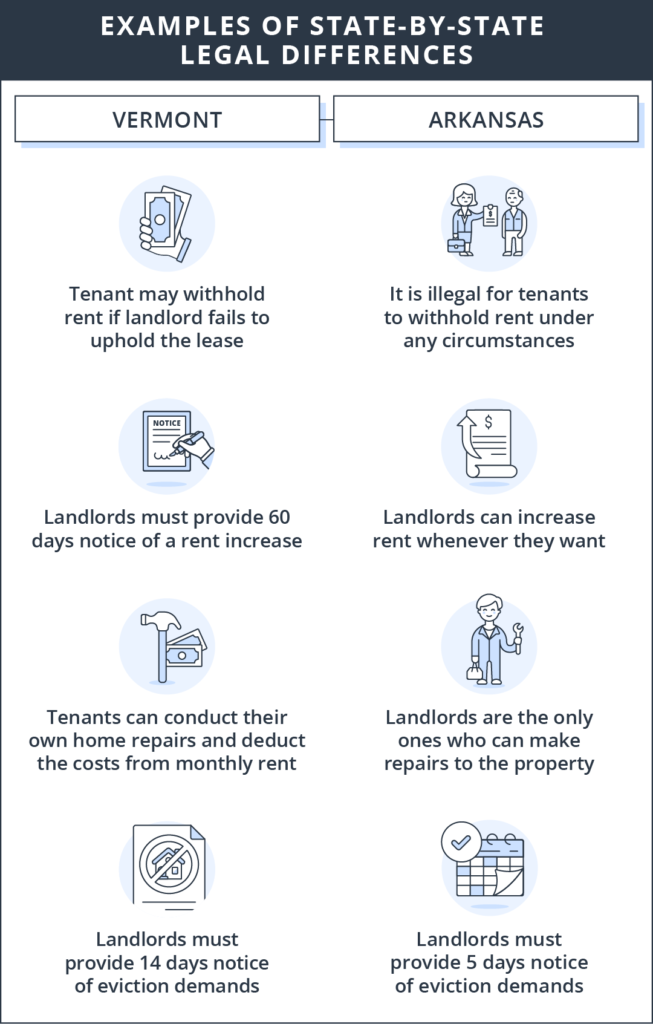
Once you understand your rights under state rental laws, you should be sure to consult your lease for the exact terms of the signed rent agreement. Make sure your lease clearly defines rent due dates, the security deposit, and what happens when unpaid rent persists over a certain number of business days.
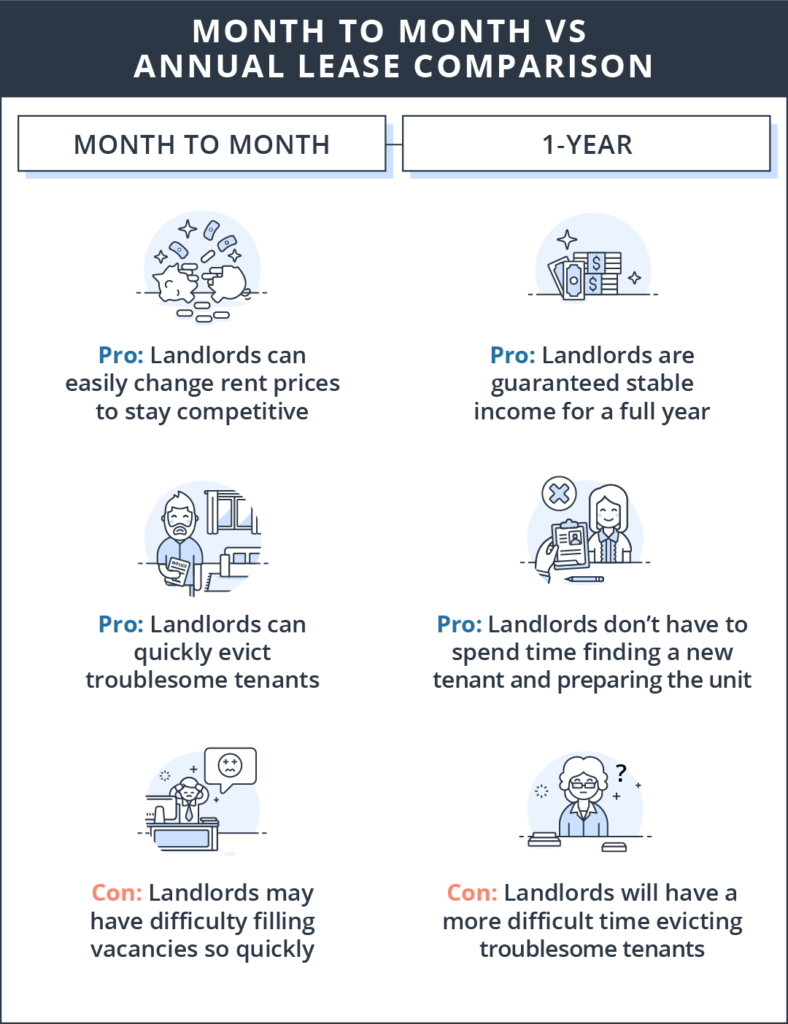
Eviction is a serious and complicated process, as you are forcibly removing someone from their home. Because of this, there needs to be a very good reason why they should no longer be allowed to occupy your rental unit. If a tenant has repeatedly violated the terms they agreed to in the lease, then you should have enough reason to terminate the rental agreement. Common reasons for eviction include:
No matter how frustrated you are by a tenant that refuses to pay rent or that has damaged your personal property, landlords are still required to uphold their end of the lease under landlord/tenant law. Not only is this legally required, but it will also give you an advantage in any ensuing court case if you can show that you gave the tenant every chance at a peaceful living environment.
Though you can decide to forego a court hearing and offer them an immediate termination of the lease in exchange for moving out, you must continue to provide access to utilities and quiet enjoyment until they fully vacate the property.
The next step in evicting a tenant is to provide written notice of your intent to evict them, detailing the timeline and summary of demands. Giving proper notice is essential for any property manager embarking on eviction proceedings, and your notice should be delivered by certified mail so the renter can’t possibly deny that they received it.
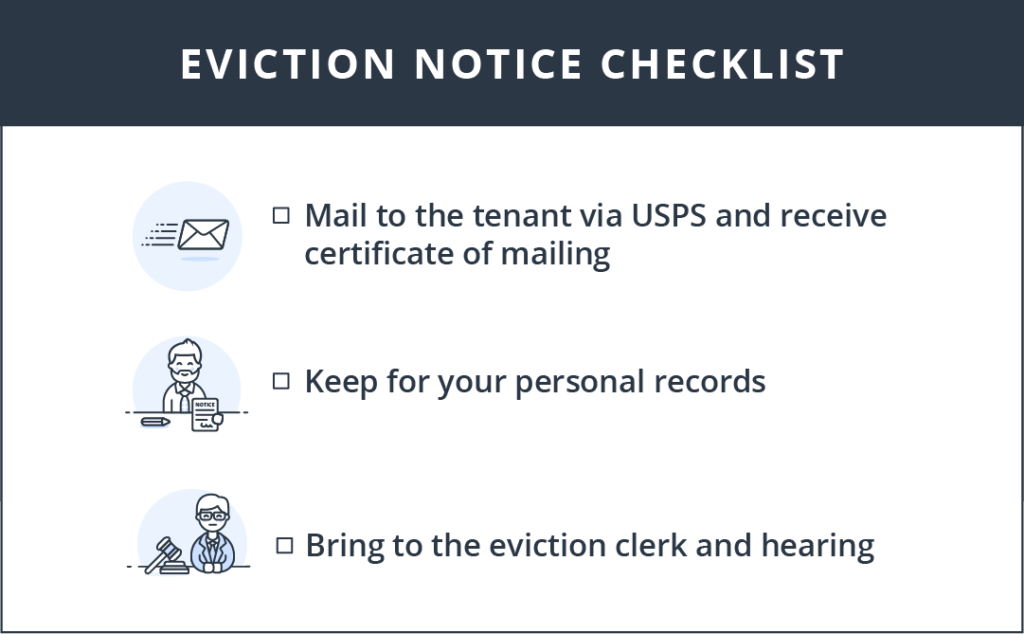
There are a few different types of eviction notices that you can write, depending on the situation and the desired outcome. The three most common types of eviction notices include:
Eviction notices should be short and to the point. They should summarize the reason(s) for eviction, total damages and rent owed (if any), a timeframe for complying with demands, and when the tenant will be evicted if they do not comply with the demands.
You can usually find state-specific eviction notice templates on government websites, or you can take a look at our fillable templates for landlords. Make sure to consult your state laws before posting the eviction notice, as many states require a certain amount of time between the initial posting and official filing with the district court.
Once you’ve posted the eviction notice and waited the appropriate amount of time according to state laws, you are ready to take your case to the local courts.
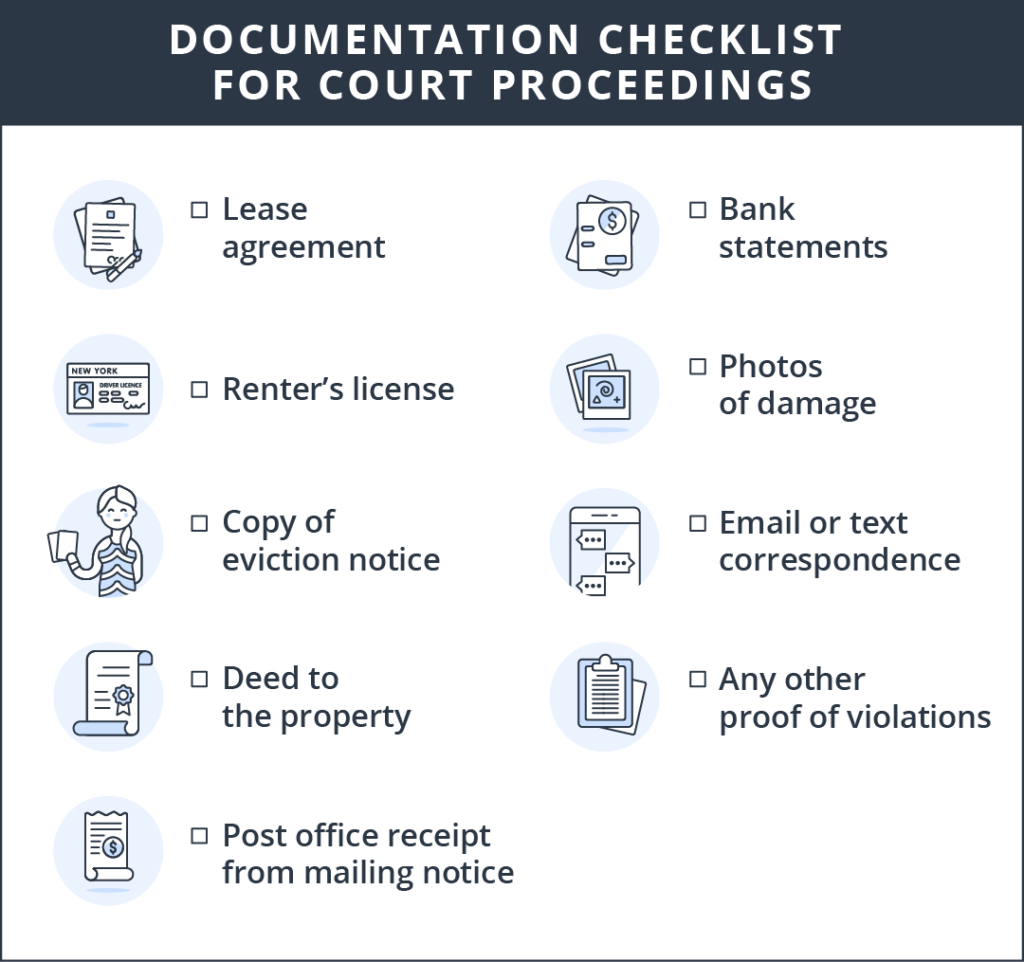
Gather your documentation (including the lease agreement, proof of lease violations, and a copy of the eviction notice) and head to your local courthouse to speak with a court clerk. The clerk will help you process the official documentation and will schedule a date for your court hearing with a judge. The clerk will also issue a summons to your renter, which requires them to be present at the hearing.
While some states provide specific timeframes for a court to hear your case, your court date will usually be scheduled for one to two months after your initial meeting with the clerk. Be sure to gather as much documentation as you can before the hearing so you can be well prepared to make your case. Landlords may represent themselves in eviction hearings or may choose to hire a real estate lawyer to speak for them.
In addition to proof of lease transgressions such as emails, texts, photos of property damage, or bank account statements, landlords may also bring witnesses who can testify on their behalf. These are often other tenants who have been exposed to the disruptive behavior of the tenant being evicted.
After the evidence is presented and both sides have made their cases, the judge will issue a court order on whether or not the tenant will be evicted, or if they will be allowed to pay for rent and damages and remain in the rental unit. The judge may also require mediation between the two parties to find a solution.
If you have a clear reason to evict a tenant and present evidence against them in court, the judge will most likely rule in your favor. The last step in the eviction process is to ensure that the tenant moves out of your rental property.
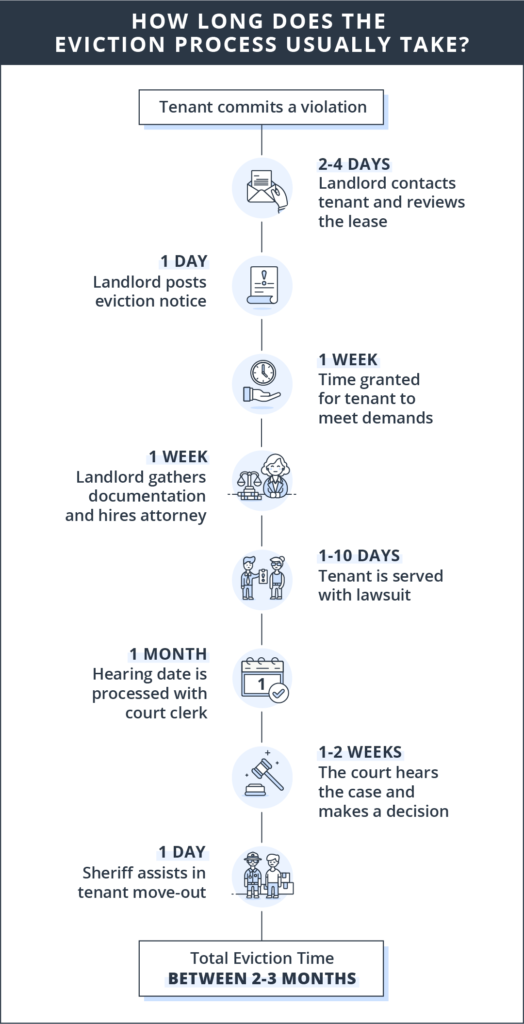
Once the judge has ruled on the eviction, they will set a date for the required move-out. This is typically about one week after the hearing to allow the tenant to make other living arrangements. Again, the property manager must still uphold their side of the lease and will not be allowed to enter the rental until the tenant has fully vacated.
However, once a judge has ruled on an eviction, the landlord will be able to call the local sheriff’s office to have a law enforcement officer present on the move-out day. This can be a good option if you think there could be trouble getting the tenant to leave.
Once the tenant has fully moved out of the unit, the landlord will then be allowed to regain full use of the rental property to clean the unit and change the locks. Depending on your state, you may or may not have received payment for past due rent by the time the tenant moves out. In some states, you can sue for payment at the same time as the eviction hearing. In other states, you may be required to file another small claims lawsuit against the former tenant in order to receive back payments on overdue rent.
Evicting a tenant is one of the most frustrating and time-consuming issues a landlord can experience. Make sure to protect yourself from future hardships by doing your due diligence when it comes to selecting new tenants.
Running tenant background checks can show you if tenants have been evicted in the past, or if they have a criminal history that might lead to issues on your property. Make sure to help other landlords as well if you have a bad experience with a tenant! You can report them to credit bureaus so that they are flagged on background checks in the future.
DISCLAIMER: TurboTenant does not provide legal advice, legal help, nor legal services. This material has been prepared for educational purposes only. All users are advised to check all applicable local, state, and federal laws, and to consult legal counsel or law enforcement should any questions arise.
An eviction is the act of expelling someone from a property. Reasons for a landlord to pursue an eviction are many, but typically include: nonpayment of rent, damage to the rental unit, or a violation to a signed rental lease agreement such as unauthorized pets, additional occupants, or illegal activity.
When a landlord successfully evicts a tenant, they regain control of their rental unit, rid themselves of a problematic renter, and may receive payment of past due rent. Eviction proceedings are arduous and can be expensive, and a property manager should only pursue them once all other options have been exhausted.
12 min read
Creative financing can offer real estate investors options beyond traditional lending from banks. If you have less-than-ideal credit or lack a sizeable...
11 min read
If you came here wondering how to write a lease agreement, look no further. Creating iron-clad rental contracts is essential for protecting the rights...
10 min read
Between the risks of running a business, a volatile and ever-changing real estate market, and the sometimes fickle attitudes of the renting...
Join the 700,000+ independent landlords who rely on TurboTenant to create welcoming rental experiences.
No tricks or trials to worry about. So what’s the harm? Try it today!
TurboTenant, Inc., © 2025
Created in Sunny Colorado